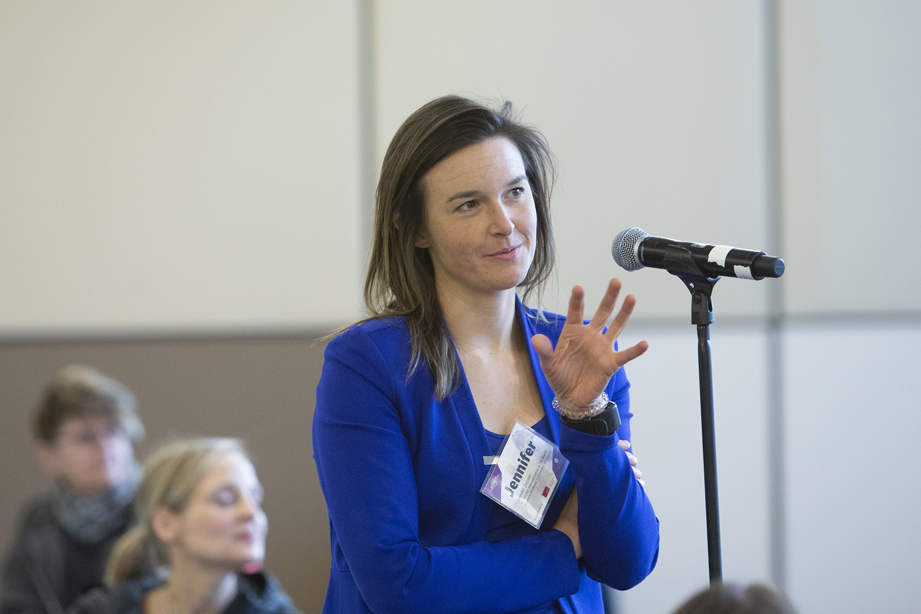Researcher in Focus: Spotlight on Dr. Jennifer Zwicker
January 21, 2020 | News

Dr. Zwicker has been a KBHN researcher since 2013. We reached out to ask her some questions about her work to support children with neurodevelopmental disabilities and their families.
Can you describe your educational path and what inspired you to get into the work you do now?
I did my PhD in neuroscience at the University of Alberta. I was always very interested in brain development and its impact on child health. From a research perspective, I found the field particularly appealing because I recognized how little we actually knew about brain-based disabilities in children, so I felt like research in this area could have a real impact.
As I was doing my PhD, I became interested in the bigger perspective of how research gets translated into directly impacting the lives of children and their families, so I ended up pursuing a Masters degree in public policy at the University of Calgary.
I’ve combined my knowledge in neuroscience, policy, and health economics into the research program that I’m currently running. All of our projects are intended to have a tangible impact beyond the more traditional path of focusing on publications and grants.
What projects are you currently working on?
We’re working on a number of projects that are quite exciting. One is in partnership with the BC government where we’re looking at basic income in a broader sense, to help determine whether basic income and basic services should be provided more comprehensively across a suite of government-run programs.
We just recently received some CIHR funding to assess a project being run at the Alberta Children’s Hospital in Calgary. The project is supported by the Alberta Children’s Hospital Foundation and is an amazing program centered around a team of care coordinators who help families with medically complex children, who also have autism or ADHD, navigate and coordinate services. We’re doing an evaluation of this project to determine its impact as well as its cost effectiveness.
We’re also wrapping up another project funded by SSHRC that’s more qualitative in nature. We’re been interviewing families across Canada asking them about their experience accessing disability supports and services. We’ve been working with KBHN investigators Dr. Lucy Lach and Dr. David Nicholas on this, to describe challenges in accessing services that families are struggling with, looking at similarities and differences across provinces and where there might be room for improvement.
With respect to KBHN, our team is working with each of the implementation projects to collect quality of life outcome measures. Basically, we want to determine the benefits and costs associated with implementing and scaling some of these projects in the future, as of way of helping teams articulate the effectiveness and efficiency of each of their research projects.
Reference: From Research to Impact: How Efficient Are Our Health Interventions?
To you, what is the biggest issue we need to address when it comes to neurodevelopmental disability research?
It’s a tough question, but I think one of the areas we can really improve on is the way services and supports are delivered to children and their families. Families have to spend a lot of time and energy figuring out how to navigate these systems. And while there is a lot of complexity associated with neurodevelopmental disabilities and it’s hard to find one solution to address them all, I don’t think the services or supports we provide need to be complex. There are ways to streamline a lot of the programs and services—for example having clear eligibility criteria that will actually capture those in need—that can have a really big impact on families. By making some simple changes to the way services are accessed and delivered we can save money in the long run and help more families in need.
What research accomplishment are you most proud of in your career so far?
We did an analysis around the Disability Tax Credit (DTC) to determine why uptake was so low. We found that only 40 per cent of disabled adults that qualitied were actually accessing it, largely due to low awareness, a burdensome application process, and poorly defined eligibility criteria. We collected this data and put forward recommendations around the appeals process and changing the eligibility criteria. What was really exciting about this research is that one of the reports we produced was brought forward to the Senate by Autism Canada as concrete evidence to support what families already knew to be true. To me, it was a really great example of how working closely with stakeholders, partners, and families around an issue allowed us to conduct research and provide clear recommendations that were able to have a real impact.
Dr. Zwicker is currently the Director of Health Policy at the School of Public Policy and an Assistant Professor in the Faculty of Kinesiology at the University of Calgary. She is also the newly appointed Deputy Chief Scientific Officer for KBHN.